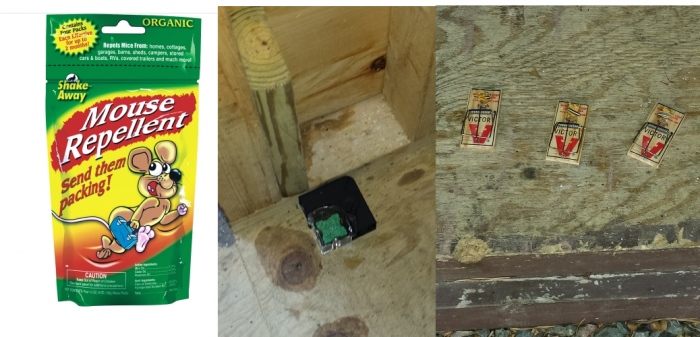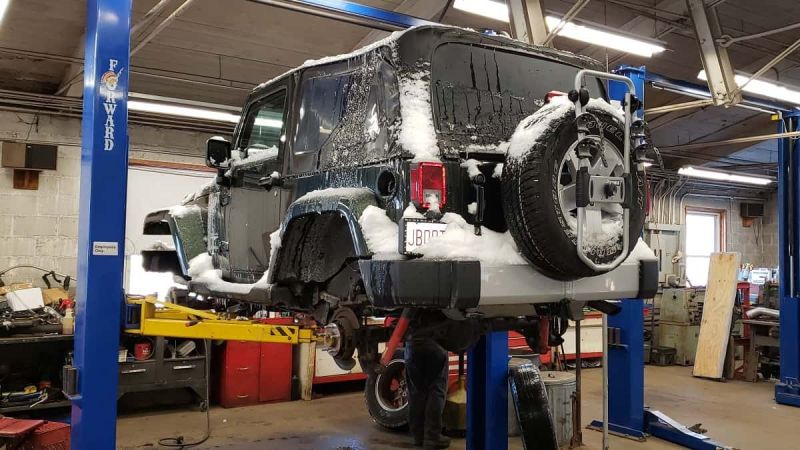When my neighbor first had me over to show me his vintage 1908 Buick Roadster we were in for a surprise. When he lifted the car cover off of it mice scurried away revealing a pile of stuffing from the car’s seats and a bunch of half-eaten wiring. Jim told me this is something he had struggled with since his family owned the car. No, it wasn’t soy-based wiring that attracted the mice to chomp on Jim’s 113-year-old car. Rather it was instinct and the need to keep a chewing habit satisfied.
The myth that car wiring is being eaten by mice and other rodents due to the industry’s ubiquitous use of modern wiring that contains soy has been discounted by experts who have been in the auto industry the longest. In his most recent Car Talk column, master mechanic Ray Magliozzi* (pronounced Mal-Yotsee) says there is no evidence linking the covering formulation of wires today and the rodent damage that has been happening since the dawn of the automobile.
Commenting on the idea that it is a new additive that is causing today’s rodent damage, Ray says, “...while this is a plausible-sounding theory and may prove to be correct someday, we haven't seen any evidence we can cite that blames soy content in wires.” Ray goes on to say, “We know they like warm places to make nests, like engine compartments. And we know they like to gnaw on stuff, because their teeth are always growing.”
While you may disagree with one of America’s most respected and best-known mechanics, what is not up for debate is that one specific brand is using a specific wiring type that is the cause of your vehicle’s damage. Simply search “Rodent damage in cars” to see the many brands that are affected. By our estimation, it is every brand. From every part of the world. "One brand’s novel soy wire" is not the cause of rodent damage in cars. Furthermore, rodents eat more than just elastomeric wire coverings in cars, They eat hard plastic components such as windshield washer tubing, induction plumbing, and even hoses.
Need more proof? The folks that produce soy commissioned a formal scientific study. Hey, why would they lie? In the study, researchers exposed elastomers and plastics with and without soy-based ingredients to mice. The mice chomped on both types quite happily. Sometimes science isn’t all that difficult to conduct.
Consumer Reports calls rodent damage to cars an "age-old problem." The group also spoke to the pest control company Terminix, which also says that soy has no role in rodent wire gnawing.

If your car’s wires have been eaten by rodents contact your insurance provider. Most auto policies with comprehensive coverage do cover damage of this type, less your deductible of course. If you’d like to prevent your vehicle from being eaten by mice, start now by controlling the rodent population where you most commonly park your vehicle.
About Ray Magliozzi: Ray is a Cambridge, Massachusetts native and MIT graduate. Along with his late brother Tom, Ray ran two auto repair businesses, the better known being the Good News Garage. Tom and Ray hosted a popular PBS radio program called Car Talk, which earned a Peabody Award. The two have also appeared in many films. Ray is presently still part of the Car Talk team and you can read and hear his wisdom at CarTalk.com.
Images by John Goreham.
John Goreham is a long-time New England Motor Press Association member and recovering engineer. John's interest in EVs goes back to 1990 when he designed the thermal control system for an EV battery as part of an academic team. After earning his mechanical engineering degree, John completed a marketing program at Northeastern University and worked with automotive component manufacturers, in the semiconductor industry, and in biotech. In addition to Torque News, John's work has appeared in print in dozens of American news outlets and he provides reviews to many vehicle shopping sites. You can follow John on TikTok @ToknCars, on Twitter, and view his credentials at Linkedin
Re-Publication. If you wish to re-use this content, please contact Torque News for terms and conditions.
Set Torque News as Preferred Source on Google












Comments
do you want to see what mice
Permalink
do you want to see what mice have done to my 4- runner? eaten wire coating, rubber, entire insullation under my hood, etc.
Yes! We'd love some images
Permalink
In reply to do you want to see what mice by am (not verified)
Yes! We'd love some images like that for the story. You can reach out to us via the Contact tab at the bottom of the Torque News Home page. Sorry to hear about the damage.
EPA vehicle biodegradability…
Permalink
In reply to Yes! We'd love some images by John Goreham
EPA vehicle biodegradability requirements led to use of soybean-based wiring insulation. Manufacturors were stuck between a rock (being barred from sales in US) and a hard place (selling vehicles that might fall apart, going down the road)--the "least bad" option was moving from petroleum based wiring insulation, to insulation made from something that is food, to rodents.
If you want images, search "vehicle wiring rodent". There are hundreds of images.
Just ran across this story
Permalink
Just ran across this story and it gave me flashbacks of when I was stationed in Germany. Martens (like a ferret) eat EVERYTHING in or on your car and US cars seemed to be more susceptible than European cars. The speculation was that there was fish oil used in the mold-release products when making hoses and trim that European car makers stopped using many years earlier.
I remember turning down my street one night and seeing a marten standing on it's hind legs against a car side door and ripping the insulation off around the top of the window. Not long after I had chunks taken out around my Corvette windows. I also ended up with a ton of dog food and Milk Bones on the top of my engine, so it must have been a great place to relax.
I just had my Highlander’s
Permalink
I just had my Highlander’s wiring chewed up one afternoon on a college campus. Turns out, somebody else in same lot I was parked in had it happen as well two days prior. Turns out, we both had one thing in common: soy-based wiring. I don’t deny rodents will chew anything as you say but they are definitely attracted to the soy more so given a choice in a parking lot that parks around 60 cars. Perhaps the rodent would have chosen that morning to just hang out under the warm hood too and chew on other things but once he found the tasty soy wiring, it dug right in and it’s main focus was only the soy wiring.
I read about the so-called
Permalink
I read about the so-called myth of rats & soy wiring. How do you feel about peppermint oil as a protection for cars, especially my Toyota camry Hybrid? 7609318813. David, California.
Peppermint oil was the best
Permalink
In reply to I read about the so-called by David Langley (not verified)
Peppermint oil was the best solution I tried of many. I soaked cotton balls in it and place them throughout the car. But, wears out over time and has to be replaced. And it is toxic for pets, so be mindful of that.
Try the product that the…
Permalink
In reply to Peppermint oil was the best by Betsy (not verified)
Its Infinity Shields Protects, battle-tested in the solid waste industry, have been using it to protect their wires, and cables and prevent nesting since 2015. It's green and called Infinity Shields Protects. non-toxic and water-based.
My insurance company believed
Permalink
My insurance company believed mice ate my Audi wiring. I thing the teeth marks and droppings sealed the deal. Totaled the car. Audi’s response was “yeah, that happens all the time”.
Not a myth. Had two cars that
Permalink
Not a myth. Had two cars that were parked side by side. The newer Toyota, they chewed $800 worth. The Subaru which was a 1998, two years before soy-based wiring started being used was untouched. Just a week ago had our 2016 Honda Civic wired chewed at $250 worth. Honestly, I think you're getting a kickback from some auto maker to write this bogus article!
I have to agree. My cousins
Permalink
In reply to Not a myth. Had two cars that by Dave (not verified)
I have to agree. My cousins has a 2019 Genesis that had the the same wire chewed twice costing $10,000 each time (covered by the insurance company). The incidents were two weeks apart. There is most definitely a problem with the wire insulation or wrapping.
Soy based wiring IS the
Permalink
Soy based wiring IS the problem. I have a 2003 Ford truck and a 2008 Mazda that are parked outside in my driveway as the rule all year long. I have found mouse droppings in both engine compartments. Aside from some insulation that has been a bit shredded (for nesting material) nothing else has been damaged. I have a 2019 Toyota Camry that is parked in the garage year round. Last week I could not park the Camry in the garage for a few days, so it stayed out in the driveway with the other 2 vehicle. Mysteriously the AC in the Camry stopped blowing cold air last week. An appt. at the dealership resulted in a diagnosis of "rodent chewed wires" and a repair cost of $8000 to replace the entire harness. I jokingly asked the service tech if Toyota was using cheese flavored wires and he said no, but they do use soy-based coating. This is absolutely caused by the enticing flavored wire insulation Toyota uses. For anyone to say otherwise shows a lack of ability to get to the truth.
Right. There may not be any
Permalink
In reply to Soy based wiring IS the by Greg (not verified)
Right. There may not be any conclusive, commissioned studies done on types of soy wiring and their appeal to mice, but it doesn't take very long at all to read thousands of testimonials about it. Maybe Toyota quashed any efforts to study it. Nonetheless, you are spot on in that this author didn't really make much of an effort to present the truth.
My 2020 RAV 4 had over $ 7000
Permalink
My 2020 RAV 4 had over $ 7000. of repair from mice .......found dead ones in glove compartment.....insurance agent stated that Toyota's are a common claim..........Toyota service admits to soy theory and the commonality
My 21 Highlander with 10,000
Permalink
My 21 Highlander with 10,000 miles on it it is in for this problem right now. In 45 years I have never had a critter in my garage. My service manager told me the coating on the wiring on Toyotas attracks the rodents. So you may not believe it but apparently Toyota does believe it. Not covered under warranty though, of course.
Just got our 2023 4runner
Permalink
Just got our 2023 4runner back from Toyota. Rat chewed through the wiring harness, not covered by warranty, had to file an insurance claim. We have never had a rodent problem and have 3 other vehicles(08′ toyota tacoma, 97′ jeep xj, 73′ chevy truck + my 09′ ford escape that we traded in) parked at our house and have lived here 5 years. I was in complete disbelief that a rat(s) could have gotten into my brand new vehicle and caused $3000 worth of damage in a month and a half, until I started researching online.
We argued with the dealership saying how could a rat chose the brand-new vehicle and leave the other vehicles alone, their answer…”it has been colder the past month and rodents will look for somewhere warm to sleep”
But now after reading everything I have read online I know they are not going to admit that it’s a problem with the coating they use on the wires, because then they would probably have to cover it under their warranty.
Sorry, have to call BS on
Permalink
Maybe it isn't the soy, but I had a 2010 Prius that was loaded with mice all the time, no matter what I tried. Some solutions would last for a while, but the mice always eventually came back to all or part of the car. Got rid of it and got a 2016 Honda CRV. No mice - ever. Same storage location, still plenty of mice around. But none in my car. I even left food in the car, and they still didn't come around. Tons of people on the net complaining about this problem with the Prius. So maybe it wasn't the soy -- I mean, if Ray says so, I'm inclined to believe him. But there is something about the Prius. So, in conclusion ... poor research and bad article.
TOYOTA is a common theme.
Permalink
TOYOTA is a common theme. But they got the lawsuit dismissed. Nice. Poor Toyota really needs the money. I had two Toyotas and loved them for everything but the mouse problem, but I'll never buy another Toyota. Mice were in the engine area, the glove box, inside the seats, in headliner, etc. etc. Insurmountable.
I have had 4 Mazda 3s and
Permalink
I have had 4 Mazda 3s and this is the first time I had this issue. I had my last Mazda 3 which was 10 years old parked in the same spot and did not have a problem. It is definitely an issue with the new cars.
Just spent $1000 at the
Permalink
Just spent $1000 at the dealer when my #2 soy coated injector harness was chewed through by this debunked problem.
So, this was a few years ago,
Permalink
So, this was a few years ago, and doesn’t really belong in this thread, anyway, except that it deals with rodents chewing automotive parts… Anyway, my ex had a squirrel break into her apt. one afternoon, & steal a piece of chocolate; she chased it off, but on her way to the school where she teaches Norwegian the next day, she said she smelled gas when she got to her car, but she assumed it was another car, & left for work. She said the smell only got worse while she was driving, and she watched the gas gauge go down, “really fast!” When she got to her destination, she checked under the hood, and found a gas line has been chewed nearly through! She’d had to replace it before she could go anywhere… Bad experience all around…
Wow that's scary; one time a
Permalink
In reply to So, this was a few years ago, by RJ (not verified)
Wow that's scary; one time a long time ago we had a 96 minivan which had all sorts of problems and one time I remember they had it up on the overhead rack and gas was spilling out. I never knew what caused the gas leak.
I thought the soy explanation
Permalink
I thought the soy explanation was a bit far-fetched, but I'm having a little trouble explaining what goes on in my driveway. I have six cars sitting out there, and there have been others over the years. They all get some rodent activity. But ONLY the newer ones WITH soy wiring have had trouble with wiring chewed through. It has happened over and over again to the same cars, while the others have had no problems. I'm about to make non-soy wiring insulation a buying criterion. I notice that Ray said that it may one day be shown that it is a problem, only that there isn't any evidence yet. I'm open to other explanations, but the article's "It happens to all cars" attitude won't begin to account for my experience.
2023 Genesis 2,500 miles .
Permalink
2023 Genesis 2,500 miles . Wiring harness destroyed , plastic cowling below wipers completely destroyed . Have been waiting for over three months for a new wiring harness. Have spent over $3,000 on rental car. Insurance would only pay for 30 days of rental on a comprehensive policy .Was told by dealership service writer to get rid of the car after it’s repaired. We plan to take the service writers suggestion. Love the car but not worth going through again .
Rats chewed the wiring
Permalink
Rats chewed the wiring harness on my Dodge Charger twice! The Equinox sitting right next to it had no damage. If it's not true why did Honda create and is selling rat deterring tape to wrap the wires. They had to use the tape on my car. Just Google Honda rat deterrent tape.
Hmmm so I’ve had cars and
Permalink
Hmmm so I’ve had cars and trucks almost fifty years and never had a problem with rodents chewing through my electrical until I got a late model Lexus. One would think manufacturers would make a greater effort to solve this problem. I finally got rid of the Lexus.
ugh! currently sitting
Permalink
ugh! currently sitting without my 2019 Toyota CHR for the SECOND TIME i n 10.5 months (May 2022 / April 2023). Last year $15000 worth of rodent damage. Yesterday woke up to all my dash lights on and FIVE warning messages across my screen. Drove to Toyota and left my car in their service parking lot prior to opening. I've had enough. They call just before closing and stated that a rodent chewed through my ABS wiring, my Airbag wiring and my Emergency break wiring and that the tech wasnt done inspecting the car for more damage. Toyota didnt even bother to call me at all today, the day before a stat holiday to provide an update on my car. So here I am long weekend, with no car.
Last year Insurance paid for the repairs, $15000, called them again they pretty much laughed and said that if I put through another claim, for the same problem in less than a year, the company may or may not pay for it again, but that they will drop me as a client at my end of year review and that I will then be flagged by high risk and no decent company will take me on, so any company that will cover me will have high premiums :( Parked in the same driveway is a Nissan (2015) Rouge and not a single sign of a rodent ever! used to park my Toyota Rav4 (2016) and my Toyota Matrix (2006) again no problems at all.
Sadly I will need to move away from Toyota vehicles, as I cant risk this anymore.
I'm inclined to believe it's
Permalink
I'm inclined to believe it's the type of wiring and/or the design of the car (easy access for rodents). Just happened to us again this morning - 4th time! We had a Chev Tahoe and an Acura MDX parked in our driveway for 20 yrs. Never had a wire chewed. We now have two porsches (2017 & 2019) - same driveway. Each have been chewed twice. Maddening and expensive.
I'm inclined to believe it's
Permalink
I'm inclined to believe it's the type of wiring and/or the design of the car (easy access for rodents). Just happened to us again this morning - 4th time! We had a Chev Tahoe and an Acura MDX parked in our driveway for 20 yrs. Never had a wire chewed. We now have two porsches (2017 & 2019) - same driveway. Each have been chewed twice. Maddening and expensive.
This article has been
Permalink
In reply to I'm inclined to believe it's by Darla Nelson (not verified)
This article has been debunked. Who paid you to write this?
My newer Porsche, VW, and Toyota have been chewed up multiple times. Do you have any idea how difficult and expensive it is to repair Porsche wiring? The engine has to be dropped! All have soy coated wires. Thousands and thousands of dollars of damage. My two '97 Jeeps, parked right next to them, have NEVER been touched by mice. There are thousands and thousands of complaints all over the internet.
THESE CAR COMPANIES NEED TO PAY FOR THEIR CONTINUING NEGLIGENCE THEY HAVE KNOWN ABOUT THIS FOR DECADES YET DO NOTHING
Pagination